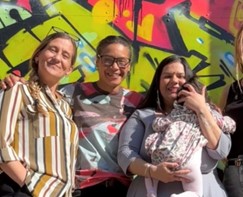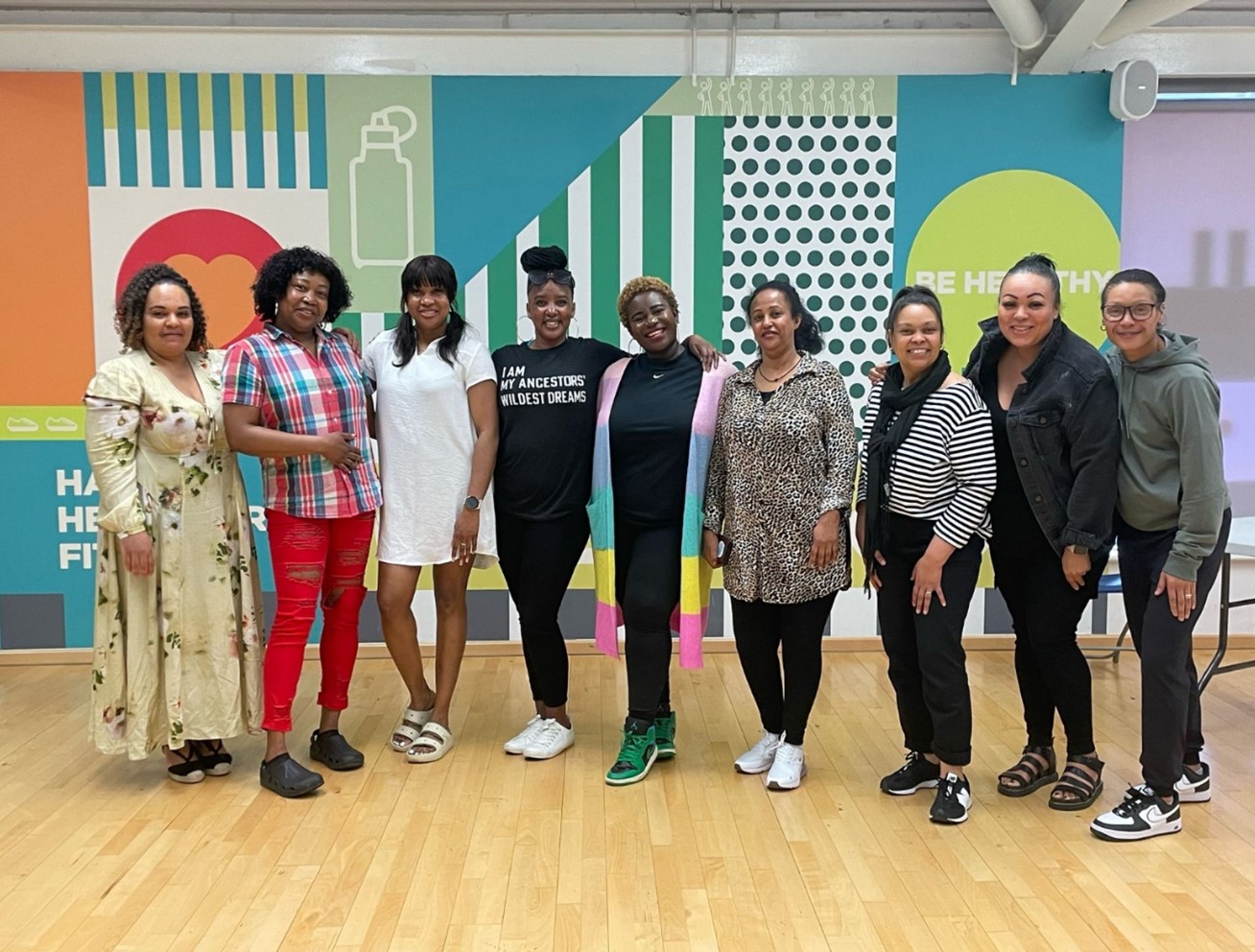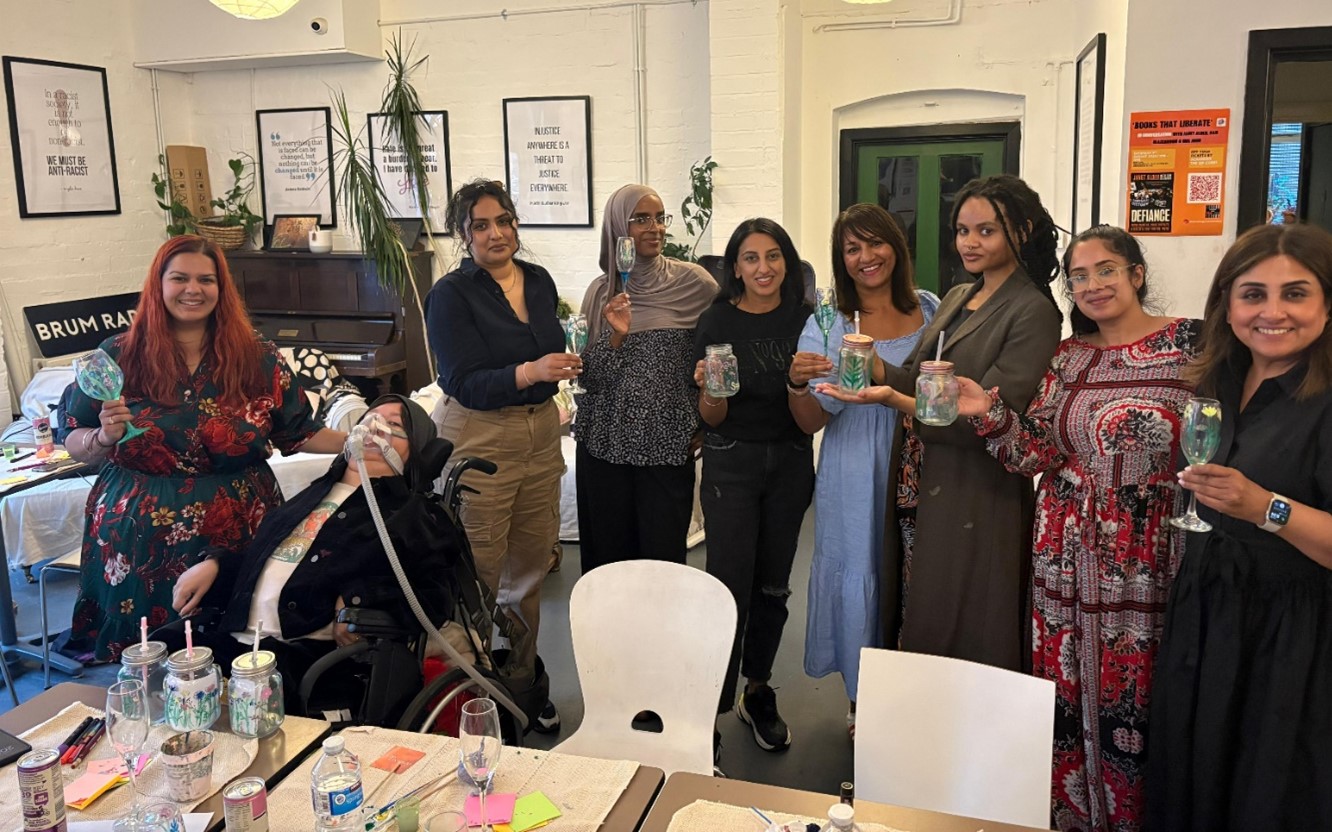This blog marks the first in a series designed to shine a spotlight on the topic of menopause throughout October and in view of World Menopause Awareness day on 18th October 2025.
The blog is jointly written by Claire Mann, Neelam Heera and Nina Kuypers

Claire is a women’s health researcher based at Warwick Medical School and her work focuses on menopause and health inequalities. Claire is currently working on mapping women’s health across the West Midlands in conjunction with West Midlands ARC. You can find Claire on LinkedIn: @DrClaireMann
Neelam is the founder and CEO of Cysters, a charity raising awareness of women’s health in South Asian communities. Neelam is an experienced PPI and co-production lead, community health researcher, and consultant. Neelam is currently representing Cysters as co-production lead on work with West Midlands ARC and Warwick Medical School. You can find more about Cysters on their website https://cysters.org/ or by following them on social media @cysters
Nina is the founder and leader of Black Women in Menopause (BWIM), an organisation raising awareness of black women’s issues in menopause. Nina is an experienced PPI and co-production lead, community health researcher, and consultant. Nina is currently representing Black women on a number of policymaking panels and is a PhD student at University of Exeter. You can find more about Black Women in Menopause on their website https://www.blackhealthandbeyond.co.uk or by following them on social media @blackwomeninmenopause
Together we have worked together on several projects including NIHR funded ‘Menopause GAP’, exploring why black and asian women are less likely to take HRT1,2, Innovate UK funded BUILD UP, exploring health inequalities3,4, digital health and menopause experiences5 and further arts-based community menopause research and impact outreach with a range of University and community partners. Neelam and Nina have independently contributed to a wide range of research in women’s health as community health researchers.6-11
Welcome to our blog – a conversation between us about evidence related to menopause and health inequalities relevant for nurses in practice today.
Introduction
Menopause seems to be having a moment. From TV adverts to celebrity testimonials, it’s suddenly everywhere.12,13 While this visibility may seem like a feminist breakthrough, some critics warn of ‘meno-washing’ – the commercialisation of menopause that prioritises profit over evidence-based care. The UK menopause market is now worth $490million14, yet our research shows that some women, particularly those with low health literacy, are spending money on solutions that lack clinical backing2. Social media influencer and algorithms (sometimes called ‘Pausevertising’) also plays a part in this movement promoting unverified remedies and lifestyle products disproportionately influencing those women who may have limited access to trusted sources or health literacy. This trend is echoed in other studies, raising concerns about misinformation and exploitation.15,16 This blog challenges this approach and calls for a more equitable, evidence-based approach to menopause care.
Increased awareness has also driven a surge in demand for hormone replacement therapy (HRT), contributing to supply shortages in some regions.1,2,17,18 Our work on the Menopause GAP project revealed that many women are now recognising their symptoms as part of perimenopause and are seeking HRT from the GP as a solution. However, this shift in demand can lead to assumptions in primary care – where GPs may assume that consistency means women will come to seek support for menopause rather than needing education and awareness.1,2
Despite growing public discourse, menopause remains a taboo subject for many women. In the current climate of NHS strain, some women rarely see a GP unless absolutely necessary, leaving many women with unaddressed symptoms and unanswered questions.1,2,19
Evidence: Menopause and Health Inequalities
Health inequalities intersect across gender, sexuality, race, and socioeconomic status, creating barriers to care for many women. The menopause sector is no exception with solutions often targeting heterosexual middle- to upper-class white women, leaving others underserved.18,19,20
There is limited research on how menopause affects women from different ethnic backgrounds. The SWAN study in the US was the first to show that Black women may experience menopause earlier and for longer durations.21,22 Our own findings from Menopause GAP support this, highlighting that Black and Asian women often have different experiences and are less likely to seek HRT. Some women in these communities find it particularly difficult to access HRT.1,2
Trust is a major issue. Historical and ongoing disparities in healthcare have led to deep-rooted scepticism in some communities.2,4,18 In our community-based events, women frequently shared that they had never discussed menopause before and some women told us that in their languages (such as Punjabi, Urdu and Chinese) there isn’t even a word for it.4 GPs told us that women facing health inequalities may not recognise menopause symptoms or be aware of HRT and its potential benefits1.
Even when informed, some women choose not to take HRT. Our studies, and others, showed that some black and ethnic minority women often prefer to manage symptoms without medicalising them.2,4,18 Lifestyle adjustments are welcomed, but they must be culturally relevant and accessible. Many expressed a desire to explore natural remedies, including dietary changes rooted in cultural traditions.2,4


Implications for Practice
Nurses are uniquely positioned to support women in perimenopause, especially in general practice.23 Nurses encounter patients during smear tests, contraceptive consultations, and coil fittings amongst a wide range of other settings and these represent moments that can open the door to meaningful conversations about menopause. Several women in our study cited nurses as the first professionals to help them understand their symptoms in these contexts.2,4
Because perimenopause can present as subtle changes at first, through aches, sleep disturbances, or mood changes, some women may not connect these symptoms to hormonal shifts.1 This presents an opportunity for nurses to educate and intervene early, potentially preventing symptom escalation.
Community education is key.1,2,4,18 There is evidence that some women fear they will get breast cancer if they take HRT.2,4 There is a need for greater education and understanding of risk. There are excellent local initiatives, often led by GP surgeries or grassroots organisations, that provide culturally sensitive menopause support1,2,18. Nurses who are aware of these resources can guide women toward them, helping bridge the gap between clinical care and community empowerment.
Appreciating and understanding that not everyone will want HRT is important. Best practice involves explaining that HRT is one potential solution that helps some women, while also encouraging them to do their own research and return with questions. Having an awareness of alternative approaches, such as lifestyle changes, natural remedies, or peer support, is essential for supporting women who prefer a less medicalised menopause experience.
Peer support plays a vital role in breaking down taboos. Many women trust and relate to peers more than professionals, and encouraging peer discussion can help normalise menopause and reduce stigma. Creating safe spaces for these conversations, whether in clinics, community centres, or online—can empower women to share experiences and seek help1,2,4,5,18.
Finally, being alert to “menowashing” and raising awareness of it is also vital. Explaining to women that there is no magic pill to cure menopause, but that peer and clinical support can walk alongside them on their menopause journey, helps foster realistic expectations and informed choices.
References
- Mann C, Shah L, Eccles, A et al. Menopause care for diverse communities: a qualitative study of GP clinician experiences. Br J Gen Pract. 2025;75(886) earlyonline. https://doi.org/10.3399/BJGP.2024.0780
- Eccles A, Keating S, Mann C et al. Accessing equitable menopause care in the contemporary NHS – womens’ experiences. Br J Gen Pract. 2025;75(887) earlyonline. https://doi.org/10.3399/BJGP.2024.0781
- Mann C, Olewe-Richards S, Hinsliff-Smith, K. Domestic Abuse survivors accessing support during peri-menopause: qualitative focus groups with women. BJGP Open 2025; (accepted for publication)
- (2024, June). Health inequalities and digital health in menopause care [Blog post with linked report]. Pausetrack. https://www.pausetrack.co.uk/blog/2024report
- Mann C, Kuypers N, Olewe-Richards S, et al. Acceptability of Digital Health solutions and AI: qualitative interviews with perimenopausal women. BMJ Innov. 2025 under review.
- Harkness, Mairi, Cassandra Yuill, Helen Cheyne, Christine McCourt, Mairead Black, Dharmintra Pasupathy, Julia Sanders, Neelam Heera, Chlorice Wallace, and Sarah Jane Stock. “Experience of induction of labour: a cross-sectional postnatal survey of women at UK maternity units.” BMJ open13, no. 5 (2023): e071703.
- Black, Mairead, Cassandra Yuill, Mairi Harkness, Sayem Ahmed, Linda Williams, Kathleen A. Boyd, Maggie Reid et al. “Cervical ripening at home or in hospital during induction of labour: the CHOICE prospective cohort study, process evaluation and economic analysis.” Health Technology Assessment (Winchester, England)28, no. 81 (2024): 1.
- Rivas, Carol, Kusha Anand, Elizabeth Ball, Samina Begum, Neelam Heera, Yesmin Shahid, Zainab Zuzer Lal, and Amanda P. Moore. “UK health and social care use during and after the pandemic: A qualitative study of the experiences of disabled people from minoritised ethnic groups.” medRxiv(2025): 2025-02.
- Rivas, Carol, Amanda P. Moore, Kusha Anand, Feryal Awan, Samina Begum, Neelam Heera, Sarabajaya Kumar, Sudhir Shah, Yesmin Shahid, and Alison Thomson. “Working in partnership with people from underrepresented groups to develop person-centred social and health care practices: methodological learnings from the CICADA study.” Frontiers in Health Services5: 1563354.
- Nash, Z., Christmas, M., Gronlund, T., Hickey, M., Burgin, J., Carpenter, J., … & Rother, V. (2024). Top ten menopause research priorities. The Lancet, 404(10471), 2535-2536.
- Nash, Zachary, Monica M. Christmas, Toto Gronlund, Jenifer Sassarini, Andrew Fisher, Sarah Hillman, Jo Burgin et al. “Protocol for a global menopause priority setting partnership.” BMJ open15, no. 6 (2025): e096401.
- Jermyn D. Whose menopause revolution? Investigating the UK’s ‘Davina effect’ and the contemporary menopause market. Eur J Cult Stud 2024;27(5):in press. doi:10.1177/13675494241287931
- Orgad S, Rottenberg C. The menopause moment: the rising visibility of ‘the change’ in UK news coverage. Eur J Cult Stud 2024;27(4):519–539. doi:10.1177/13675494231159562
- Grand View Research. (2024). UK Menopause Market Size & Outlook, 2024–2030. Retrieved from https://www.grandviewresearch.com/horizon/outlook/menopause-market/uk
- Denniss, E., & Lindberg, R. (2025). Social media and the spread of misinformation: infectious and a threat to public health. Health promotion international, 40(2), daaf023.
- Kaňková, J., Binder, A., & Matthes, J. (2024). Helpful or harmful? Navigating the impact of social media influencers’ health advice: insights from health expert content creators. BMC Public Health, 24(1), 3511.
- Alsugeir D, Wei L, Adesuyan M, et al. Hormone replacement therapy prescribing in menopausal women in the UK: a descriptive study. BJGP Open 2022;6(4):BJGPO.2022.0126. doi:10.3399/BJGPO.2022.0126
- Hillman, S., Shantikumar, S., Ridha, A., Todkill, D., & Dale, J. (2020). Socioeconomic status and HRT prescribing: a study of practice-level data in England. British Journal of General Practice.
- MacLellan, J., Dixon, S., Bi, S., Toye, F., & McNiven, A. (2022). Primary care practitioners’ experiences of peri/menopause help-seeking among ethnic minority women. J. Gen. Pract, 73, e511-e518.
- Prasad S, Menopause in ethnic minority women. Post Reprod Health. 2023;29(4),236-9.
- Harlow, S. D., Burnett-Bowie, S. A. M., Greendale, G. A., Avis, N. E., Reeves, A. N., Richards, T. R., & Lewis, T. T. (2022). Disparities in reproductive aging and midlife health between Black and White women: the Study of Women’s Health Across the Nation (SWAN). Women’s midlife health, 8(1), 3.
- Green, R., & Santoro, N. (2009). Menopausal symptoms and ethnicity: the Study of Women’s Health Across the Nation. Women’s Health, 5(2), 127-133.
- Roberts, P. J., & Sibbald, B. (2000). Menopause health care provision: the views of women, general practitioners and practice nurses. British Menopause Society Journal, 6(4), 154-158.